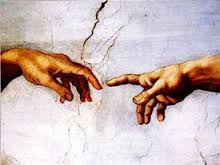I was a fresh new chaplain resident at the VA Medical Center when I met Mr. Miller, a World War II veteran who had been admitted for back surgery after a fall at home. Confused, dismayed, and catheterized, he was confined to a wheelchair and obliged to wear a plastic brace front and back like a piece of body armor. His daughter, a nurse in another hospital, was full of questions for the medical staff. Would her father ever recover his former lucidity and mobility? If not, how would her mother cope with him at home? In his confused state, the family talk about nursing homes and DNR orders was clearly going right over Mr. Miller’s head.
The following week, I learned Mr. Miller was much improved. His medications had been balanced out, and he was now lucid and attentive to what was happening around him. Talk now was of sending him home to complete his recovery there. His daughter was more positive but still concerned for her mother’s ability to cope. When prompted to speak up, Mrs. Miller confessed in a strained voice, “I’m a person of faith. But I must admit I’m afraid.”
Two days later, I was anxious to see Mr. Miller when I came on his ward. As I entered his room, he smiled and motioned me over. “Come in and sit down for a while, chaplain,” he said. His long white hair and goatee beard made me think of Colonel Sanders and fried chicken. But a sudden change came over him as I drew up a chair and sat by his bed. Mr. Miller screwed up his eyes, lifted his face to the ceiling, and began weeping.
“Oh, Mr. Miller, what’s wrong?” I asked in surprise.
Slowly squeezing out the words, he answered between sobs: “I think I’ve finally come to the reality of my situation. My wife’s gonna have to take care of me and I never, ever wanted that. I never wanted that!” With clenched fists he pounded the plastic brace on his chest over and over again.
I let him cry, then said gently “I’m so sorry, Mr. Miller.”
“I’ve never cried before in my life,” he sobbed. “I’m afraid. I was OK until that meeting the other day. Did you hear what my wife said? She said she was afraid. It didn’t hit me until she said she was afraid. She has glaucoma in one eye and a cataract in the other. And now she’s got to take care of me. I never wanted that!” He banged his brace again in frustration. “I wanted to take care of her,” he cried through tears of frustration. “I’ve been thinking about it all night and now I am afraid.” He looked up at me incredulously: “I went all through World War II, was shot at and all, but I was never afraid. And now I am.”
A long silence followed Mr. Miller’s declaration until I finally broke it with a suggestion. “Well maybe you’re afraid now because you’re afraid for someone else, not yourself. For your wife. Do you think that could be it?”
Slowly, Mr. Miller nodded his head. “Yeah, that’s it. I’m afraid I’ll be a burden to her now.” The tears started rolling down his cheeks.
“Have you had a chance to talk to her about these feelings, Mr. Miller?” I asked.
“No. I haven’t seen her yet today. I haven’t had the chance to talk to anybody. In fact, I think God sent you through that door just now so I could tell you,” he said.
I smiled. “Well yes, I think maybe God did.” Mr. Miller calmed down at that thought, lying quietly for a while with his hands folded across the hated plastic body brace. I turned at a sudden noise from the door behind me. Mr. Miller’s wife and son were arriving. I stood up, making ready to leave. “Well, Mr. Miller I’ll go now and leave you with your family, but I can come back later if you’d like to talk some more.”
The old man reached out and put a hand on my arm. “No, I’d like you to stay.” Turning to his wife, Mr. Miller began “Honey, I’ve got something to say to you” then burst into tears. In unison, wife and son cried out “What’s wrong?” and “What’s the matter Pops?” as they rushed to his bedside.
“I just don’t want to be a burden to you,” he squeezed out between sobs. “I was OK until you said what you did at the meeting the other day,” looking at his wife with tears in his eyes. “What did you say, mom?” asked the son. “She said she was afraid,” Mr. Miller sobbed. As his mom leaned over to hug and kiss Mr. Miller, the son looked at me quizzically.
“I was at that meeting, and yes, I did hear that,” I admitted. “But do you know what else I heard? I heard your wife say she is a person of faith.” I stepped back and watched as Mrs. Miller comforted her husband. “Oh, you old silly. That was my thought then. But now I’ve had time to think some more and get help from the rest of the family to figure things out. It’s going to be OK. We’ll manage,” she said, calming and soothing her husband. “We always have and we always will.”
I stood by the hospital bed quietly feeling their burden being lifted. By simply being present to this man in his time of fear and anxiety–in the valley of the shadow of death–I was granted the incredible gift–the grace–of sharing in this moment of healing as they faced their fears together.
© 2013 Chaplain David Pascoe


Recent Comments